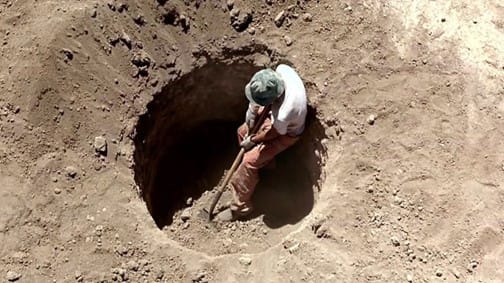Molly Ivins famously observed, “The first rule of holes is, when you’re in one, stop digging.” Thomas Friedman added, “When you’re in three, bring a lot of shovels.” Reflecting on the story of Isaac in Genesis, I’m inclined to think Friedman was channeling the Torah.
Isaac faced adversarial neighbors who sought to undermine his survival. The Philistines stopped up the wells that his father, Abraham, had dug. In a harsh, arid landscape, obstructing a water source isn’t just an inconvenience; it’s an existential threat.
“Isaac dug anew the wells which had been dug in the days of his father Abraham and which the Philistines had stopped up after Abraham’s death, and he gave them the same names that his father had given them.” (Genesis 26:18)
Isaac’s actions were not about innovation but continuity. He wasn’t trying to build something new; he was restoring what had been lost. By redigging the wells, Isaac extended his father’s legacy and sustained his family and community.
In the Torah, wells represent more than just a source of water—they symbolize connection and gathering. Rebecca met Abraham’s servant at a well, Tzipporah encountered Moses at a well, and throughout Jewish tradition, wells are places of critical encounters and shared purpose.
Today, Isaac’s determination to reopen his father’s wells challenges us to reflect on the legacies we want to protect. Many of these legacies are at risk:
The legacy of Jewish comfort in America is being stopped up by rising anti-Semitism.
Doubts about our voting systems are threatening the foundation of our democracy.
Caring communities are dissolving as we retreat into online shopping, social media trolling, and TikTok distraction.
Isaac teaches us that there is a time for innovation and a time for restoration. Reopening the wells of our fathers—those symbolic fonts of civility, freedom, and connection—has never been more vital. Without them, the sources that sustain our society may collapse under the weight of discord, subjugation, and disconnection.
I offer an example. I have devoted myself to fostering relationships with our African American neighbors in Maryland. Some question the value of these efforts. Alliances between Jewish Americans and other minority groups have frayed. After decades of interfaith work, skeptics point out that some allies have failed to support Jewish Americans in their concerns about Israel and the fight against anti-Semitism. But as I reflect on both the Torah and Tom Friedman’s advice, I believe this is precisely the moment to bring more shovels to the task. Relationships between groups is not a one time dig, but an ongoing process that requires opening and reopening.
Isaac’s story reminds us that progress is not always about creating something new. Sometimes, it’s about preserving and restoring the essential foundations that sustain life and community. In a world increasingly fragmented, reopening these wells of connection and understanding is not just a choice—it’s a necessity.
Rabbi Evan J. Krame





